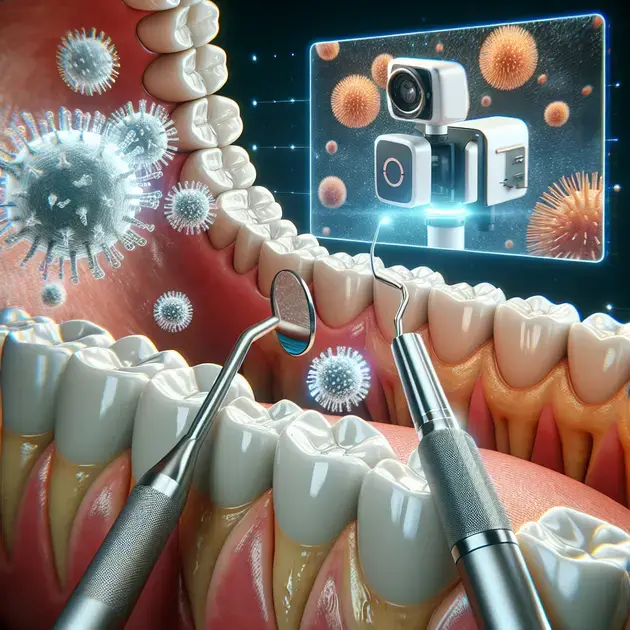Are you struggling with periodontitis and looking for the most effective medication to manage this condition? Look no further! This comprehensive guide will provide you with all the information you need to understand periodontitis and discover the most effective medications currently available on the market.
Periodontitis, a severe gum infection that damages the soft tissue and destroys the bone that supports your teeth, can lead to tooth loss if left untreated. Fortunately, with the right medication and proper dental care, you can effectively manage and even reverse the effects of this condition. In this guide, we will explore the different medications that have been proven to be highly effective in treating periodontitis and improving your oral health.

The Best Medication Options for Periodontitis Treatment
When it comes to treating periodontitis, choosing the best medication options is crucial for effective management of the condition. Here are some of the top medications that are commonly recommended:
Antibiotics:
Antibiotics such as doxycycline and minocycline are often prescribed to help control bacterial infections associated with periodontitis. These medications can be taken orally or applied directly to the affected areas. One popular platform where you can find more information about these antibiotics and their effectiveness in treating periodontitis is the website of the American Academy of Periodontology.
Antiseptic Mouthwashes:
Antiseptic mouthwashes containing chlorhexidine are beneficial in reducing bacteria in the mouth and can help in managing periodontal infections. Websites like WebMD offer detailed reviews and recommendations on the best antiseptic mouthwashes for periodontitis treatment.
Anti-Inflammatory Medications:
Nonsteroidal anti-inflammatory drugs (NSAIDs) like ibuprofen can help reduce inflammation and alleviate pain associated with periodontitis. It’s important to consult with a dentist or healthcare provider to determine the most suitable NSAID for your condition. Healthline is a reliable resource for information on the use of NSAIDs for periodontitis management.
Prescription Toothpaste:
Specialized prescription toothpaste containing fluoride or other active ingredients may be recommended for individuals with periodontitis to help control bacterial growth and prevent further complications. The website of the Mayo Clinic provides insights into the different types of prescription toothpaste available for periodontitis treatment.
Professional Dental Treatments:
In addition to medications, professional dental treatments such as scaling and root planing, dental surgeries, and laser therapy are vital for managing advanced cases of periodontitis. Dentistry Today is a reputable platform that covers the latest advancements in professional dental treatments for periodontitis.
Understanding Periodontitis: Causes and Symptoms
Periodontitis is a serious gum infection that damages the soft tissue and destroys the bone that supports your teeth. Understanding the causes and symptoms of periodontitis is essential for early detection and effective treatment. Here’s a breakdown of the key factors:
Causes of Periodontitis:
Periodontitis is primarily caused by the build-up of plaque, a sticky film of bacteria that forms on teeth. Poor oral hygiene, smoking, genetic predisposition, and certain medical conditions like diabetes can increase the risk of developing periodontitis. The National Institute of Dental and Craniofacial Research (NIDCR) offers comprehensive information on the causes of periodontitis.
Symptoms of Periodontitis:
Common symptoms of periodontitis include swollen or receding gums, persistent bad breath, loose teeth, and gums that bleed easily. If left untreated, periodontitis can lead to tooth loss and other serious health complications. The Centers for Disease Control and Prevention (CDC) website has detailed resources on the symptoms and progression of periodontitis.
Diagnosis and Treatment:
Diagnosing periodontitis typically involves a comprehensive dental examination, including measuring the depth of gum pockets and assessing dental X-rays. Early-stage periodontitis can often be managed through professional cleanings and improved oral hygiene practices. The American Dental Association (ADA) website provides guidelines on the diagnosis and treatment of periodontitis.
Preventive Measures:
Practicing good oral hygiene, including regular brushing, flossing, and dental check-ups, plays a key role in preventing periodontitis. Avoiding tobacco products, maintaining a healthy diet, and managing underlying health conditions can also help reduce the risk of developing gum disease. The Oral Health Foundation offers valuable tips on preventive measures against periodontitis.
How to Choose the Right Medication for Periodontitis Management
Selecting the appropriate medication for managing periodontitis involves considering various factors such as the severity of the condition, individual medical history, and treatment goals. Follow these steps to ensure you choose the right medication:
Consult with a Dental Professional:
The first step in selecting the right medication for periodontitis is to consult with a qualified dental professional. A dentist or periodontist can assess your oral health, discuss treatment options, and recommend the most suitable medications based on your specific needs. The American Academy of Periodontology website offers a “Find a Periodontist” tool to help you locate a specialist in your area.
Review Medication Options:
Once you receive recommendations from your dental provider, take the time to research and understand the various medication options available for managing periodontitis. Consider factors such as dosage, administration method, potential side effects, and overall effectiveness. Websites like Drugs.com provide detailed information on different medications used in periodontitis treatment.
Consider Individual Factors:
Take into account your medical history, existing health conditions, allergies, and lifestyle habits when choosing a medication for periodontitis management. Certain medications may interact with other drugs or have contraindications for specific health issues. Always inform your healthcare provider about any existing medical conditions before starting a new medication. The Mayo Clinic website offers insights into personalized medicine approaches for periodontitis treatment.
Follow Treatment Guidelines:
Adhere to the prescribed treatment plan and medication regimen provided by your dental professional. Consistent use of medications, along with proper oral hygiene practices, is essential for effective periodontitis management. If you experience any adverse reactions or have concerns about the medication, don’t hesitate to consult with your dentist or pharmacist. The U.S. Food and Drug Administration (FDA) website outlines guidelines for safe medication use.
Monitor Treatment Progress:
Regularly monitor your oral health and track the progress of your periodontitis treatment. Keep scheduled follow-up appointments with your dental provider to evaluate the effectiveness of the medication and make any necessary adjustments to your treatment plan. Websites like Healthgrades offer tools for tracking and managing your healthcare journey, including periodontitis treatment progress.

Understanding Periodontitis: Causes and Diagnosis
Periodontitis is a serious gum infection caused by bacteria that attack the gums and the structures that support the teeth. Poor oral hygiene is the main cause of periodontitis, as it allows plaque to build up on the teeth and harden into tartar. This buildup of plaque and tartar can lead to inflammation of the gums, known as gingivitis, which, if left untreated, can progress to periodontitis.
Other factors that can contribute to the development of periodontitis include smoking, genetic predisposition, certain medications that reduce the flow of saliva, and underlying health conditions such as diabetes. It is essential to diagnose periodontitis early to prevent further damage to the gums and teeth.
Your dentist can diagnose periodontitis through a comprehensive dental examination, which may include probing the pockets around the teeth to check for signs of inflammation and infection. X-rays may also be taken to assess the extent of bone loss due to periodontitis.
If you notice symptoms such as swollen or bleeding gums, persistent bad breath, loose teeth, or receding gums, it is important to seek prompt dental care for a proper diagnosis and treatment plan. Early detection and intervention are key to managing periodontitis effectively.
In conclusion, understanding the causes and diagnosis of periodontitis is crucial for maintaining good oral health. By addressing risk factors and seeking professional dental care, you can prevent the progression of periodontitis and preserve your smile for years to come.
Exploring Effective Treatment Options for Periodontitis
When it comes to treating periodontitis, several effective options are available to help control the infection and restore gum health. The primary goal of treatment is to remove the bacteria causing the infection and reduce inflammation to prevent further damage to the gums and supporting structures.
Non-surgical treatments such as scaling and root planing are commonly used to clean the teeth below the gum line and remove plaque and tartar. This procedure helps to smooth the roots of the teeth to promote gum reattachment and reduce the risk of bacterial growth.
In more severe cases of periodontitis, surgical interventions such as flap surgery or bone grafting may be necessary to repair damaged tissues and restore the health of the gums. These procedures aim to reduce pocket depths around the teeth and facilitate better oral hygiene practices.
Adjunctive therapies like antimicrobial mouth rinses or locally applied antibiotics are often recommended to supplement traditional treatments and enhance the effectiveness of periodontal care. These additional measures can help target stubborn bacteria and promote healing in areas that are difficult to reach with conventional methods.
It is important to follow your dentist’s recommendations for post-treatment care and attend regular maintenance appointments to monitor your gum health and prevent recurrence of periodontitis. By exploring all available treatment options and maintaining good oral hygiene practices, you can effectively manage periodontitis and preserve the health of your smile.
Guidelines for Selecting the Best Medication for Periodontitis
When choosing medication for the treatment of periodontitis, it is essential to consider the specific needs of each patient and the severity of their condition. The selection of the best medication should be based on factors such as the extent of gum infection, the presence of underlying health conditions, and the patient’s response to previous treatments.
Antibiotics are commonly prescribed to combat the bacteria that cause periodontitis and reduce inflammation in the gums. Oral antibiotics like doxycycline or amoxicillin may be used for short-term treatment, while locally administered antibiotics such as minocycline microspheres can target bacteria in deeper pockets around the teeth.
Anti-inflammatory medications like ibuprofen or aspirin may also be recommended to help manage pain and reduce swelling associated with periodontitis. These medications can complement other treatments and improve the patient’s comfort during the healing process.
In some cases, antimicrobial mouth rinses containing chlorhexidine or essential oils may be prescribed to help control bacterial growth and maintain oral hygiene. These rinses can be used as an adjunct to regular brushing and flossing to promote gum health and prevent the recurrence of periodontitis.
It is important to follow your dentist’s instructions carefully when taking medication for periodontitis and to report any side effects or concerns promptly. By selecting the most appropriate medication based on individual needs and maintaining good oral hygiene practices, you can effectively treat periodontitis and support the long-term health of your gums and teeth.
Conclusion
Understanding Periodontitis: Causes and Diagnosis
Periodontitis, a severe gum infection initiated by bacterial attack on gum and teeth support structures, results primarily from poor oral hygiene leading to plaque buildup and tartar hardening. Additional causative factors include smoking, genetic predisposition, certain medications reducing saliva flow, and underlying health conditions like diabetes. Early diagnosis by a dentist through thorough examination and X-rays is crucial to prevent extensive gum and teeth damage.
Exploring Effective Treatment Options for Periodontitis
Various treatment avenues like scaling and root planing, surgical procedures such as flap surgery or bone grafting, and adjunctive therapies with antimicrobial agents aim at controlling infection, reducing inflammation, and restoring gum health. Effective post-treatment care and regular maintenance appointments are vital to monitor gum health, prevent recurrence, and preserve a healthy smile in the long term.
Guidelines for Selecting the Best Medication for Periodontitis
Personalized medication selection based on gum infection severity, underlying health conditions, and treatment response is essential. Antibiotics, anti-inflammatory drugs, and antimicrobial mouth rinses play a crucial role in combating bacteria, managing pain and swelling, and controlling bacterial growth to support effective periodontitis treatment. Adherence to dentist recommendations and maintaining good oral hygiene practices are key in ensuring successful treatment outcomes and long-term gum and teeth health.



